On February 22 and 23, citizens in Iran held at least seven rallies and protests in various cities, in addition to the massive protests of Baluch residents in Saravan city, Sistan and Baluchestan province. In response to security forces opening fire on a group of fuel carriers and killing dozens of people, residents attacked the local Governorate and set there ablaze.
The situation of Saravan is still tense, and officials have banned the people from access to the internet. Furthermore, Iranian citizens staged seven rallies and protests in various cities, including in front of the Parliament (Majlis). They expressed their despair over the officials’ failure to meet their long-standing demands.
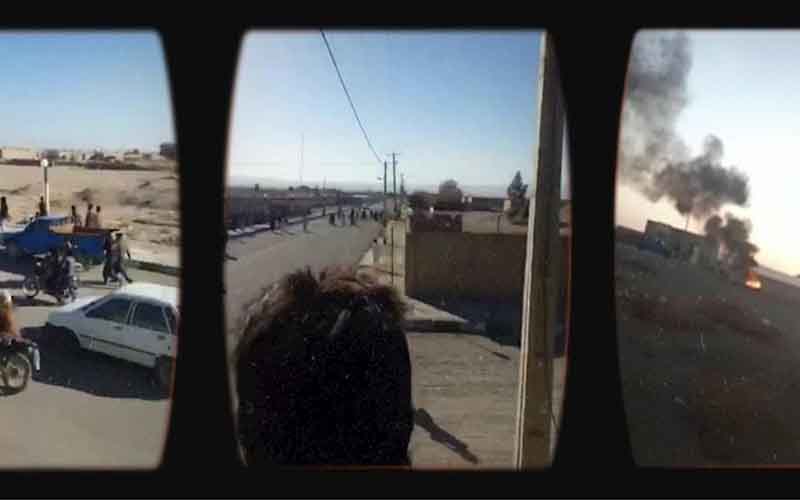
Baluch Fuel Carriers Uprising
Sistan and Baluchestan province—following the Revolutionary Guards (IRGC) murder of several Iranian Baluchi fuel porters and protesters in Saravan city on Monday, February 22, many people flooded onto the streets, protesting the regime’s oppressive measure and bloodshed.
#BREAKING#Iran's IRGC targeted Baluch citizens, who are carrying fuel to make ends meet, with live ammunition, leading to several deaths and injuries.#HumanRights activists in Saravan city identified at least six victims as of this report.
Witnesses say victims are far higher. pic.twitter.com/CFc0kd7kWk— Iran News Update (@IranNewsUpdate1) February 22, 2021
According to the Iranian opposition coalition National Council of Resistance of Iran (NCRI), the regime has killed at least 40 Baluch fuel carriers and protesters as of this report. In response, residents attacked and took over Saravan Governorate, and set its appliances ablaze. Protesters also overturned several security forces’ vehicles and set them on fire, venting their anger at the regime’s cruelty.
The IRGC dispatched tanks, artillery, and special units to crack down on protesters. The regime also cut off the internet, preventing human rights defenders and activists from covering the news.
In November 2019, the mullahs applied the same tactic to conceal their crimes against defenseless protesters, leading to the death of more than 1,500 unarmed demonstrators.
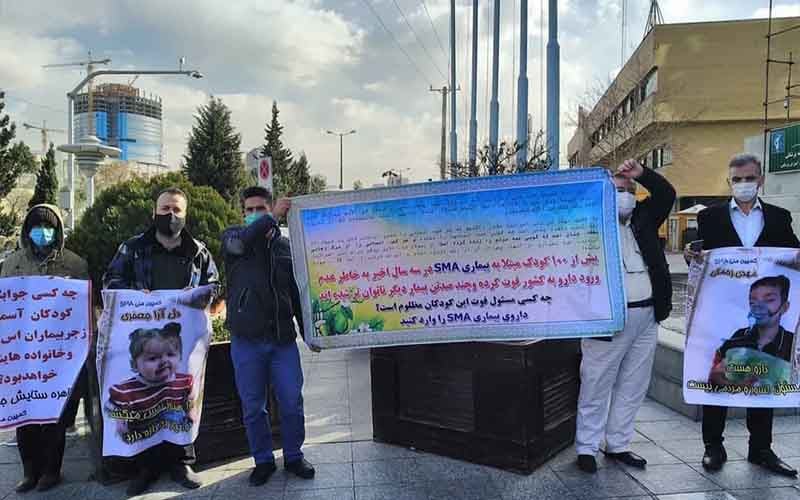
Rally of SMA Patients’ Families
Tehran province—families of (Spinal Muscular Atrophy) SMA patients once again held a gathering in front of the Health Ministry on February 22. In the past ten days, they have rallied two times at the place, protesting officials’ failure to import necessary medication.
On February 13, based on prior notice, these families gathered at the same place, blaming officials’ failure to provide medicine for muscular atrophy. At the time, Health Ministry officials promised to schedule an appointment for protesters to visit Minister Saeed Namaki. However, the visit did not take place, prompting families to rally once again.
#IranProtests#Tehran—families of Spinal Muscular Atrophy (SMA) patients rallied in front of the Health Ministry for the second time in the past ten days. They protested the government's failure to import medicine despite importing unnecessary items. pic.twitter.com/YAxjaDod8b
— Iran News Update (@IranNewsUpdate1) February 22, 2021
“Our children have rights for treatment and life,” “Why does Iran not provide reliable medicine so far?” and “Sanctions are only an excuse for not importing the medicine,” had been written on protesters’ placards.
SMA is a group of hereditary diseases that progressively destroys motor neurons—nerve cells in the brain stem and spinal cord that control essential skeletal muscle activity such as speaking, walking, breathing, and swallowing – leading to muscle weakness and atrophy.
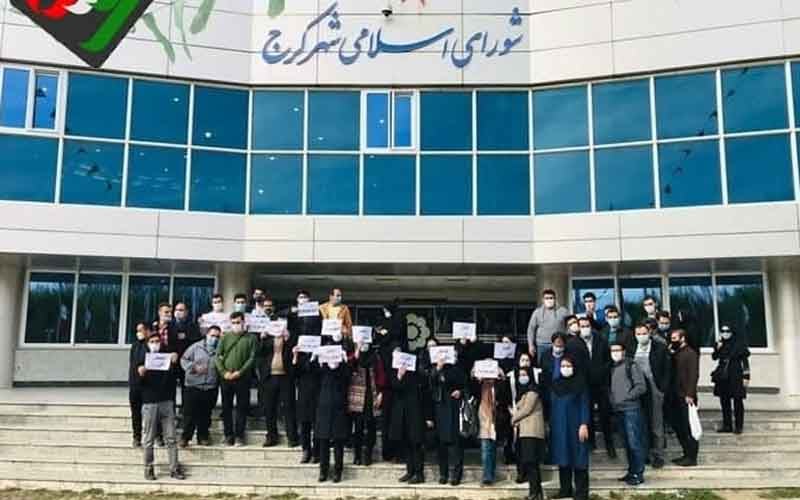
Rally of Contract Forces
Alborz province—a group of contract forces affiliated with Karaj Municipality, the province’s capital, staged a rally in front of Karaj City Council on February 22.
They protested officials’ failure to clarify the situation of contracts. Such institutions have recruited many people under contracts, refusing to hire them officially. These contracts have allowed municipal officials to ignore workers’ rights easily.
#IranProtests#Alborz—contract forces of Karaj Municipality rallied in front of the City Council, protesting officials' failure to clarify their contracts' conditions. pic.twitter.com/RCEkDHB0xz
— Iran News Update (@IranNewsUpdate1) February 22, 2021
In this status quo, while people suffer from the coronavirus outbreak and its consequences but due to government-backed institutions’ actions, the fate of impoverished workers is murky. Earlier, state-run media acknowledged that over 90 percent of Iran’s working families face economic dilemmas, and even deal with poor nutrition in some provinces.
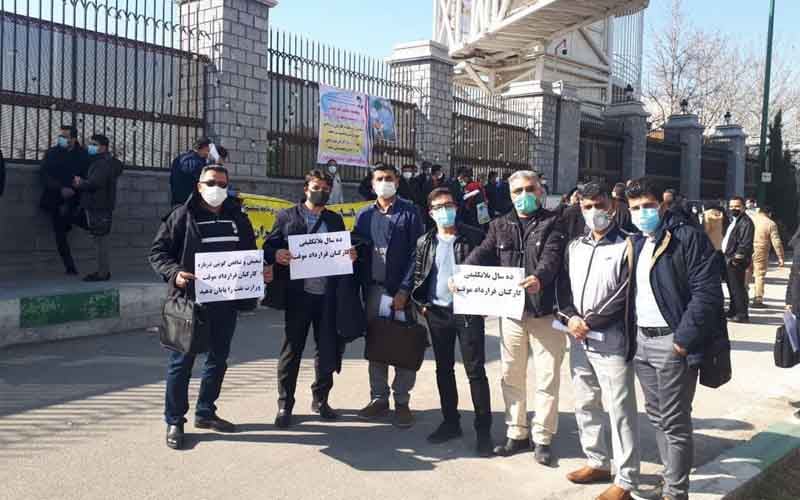
Rallies of Contract Health Staff
On February 21 and 22, several contract medical and health staff affiliated with the medical sciences universities referred to relevant local offices and the universities in various provinces. They demanded officials pay attention to their wage claims and their dire living conditions.
“Refusing to implement basic rules has prompted healthcare workers to protest. No doubt, the rally of contract colleagues has sounded alarm bells for officials. The continuation of negligence toward rules and refusal to pay health and medical staff’s paychecks and demands would expand protests,” said contract forces.
#IranProtests
On February 21 & 22, contract medical staff in different provinces referred to relevant institutions and medical sciences universities, urging officials to meet their wage demands.
They protested discrimination in salaries:
Contract=$100
Planned=$148
Official=$256 pic.twitter.com/bh12GBu3xW— Iran News Update (@IranNewsUpdate1) February 23, 2021
They expressed their wrath about systematic discrimination, saying, “Unjust distribution of working hours between emergency staff, hospitals’ emergency sections, special sections like intensive care units (ICU) and critical care units (CCU), or health centers, as well as the rejection of paying the rights of housing, clothes, and other issues,” are parts of these staff’s problems.
“Regarding this density of missions during the coronavirus conditions, in addition to economic dilemmas and rampant inflation, health and medical staff face severe hardship in their life,” said a protester, adding, “Our most important demand is to implement the rule of exploitation for our emergency partners.”
They also posted a photo of three receipts, showing flagrant discrimination between three emergency staff with the same expertise and job experience. According to the photo, the contract force monthly receives $100; his partner, who has been hired according to a plan, receives $148 per month; and an official staff monthly receives $256. “This is while the contract force’s job experience is more than two others. Is this justice?” a protester had written under the photo.
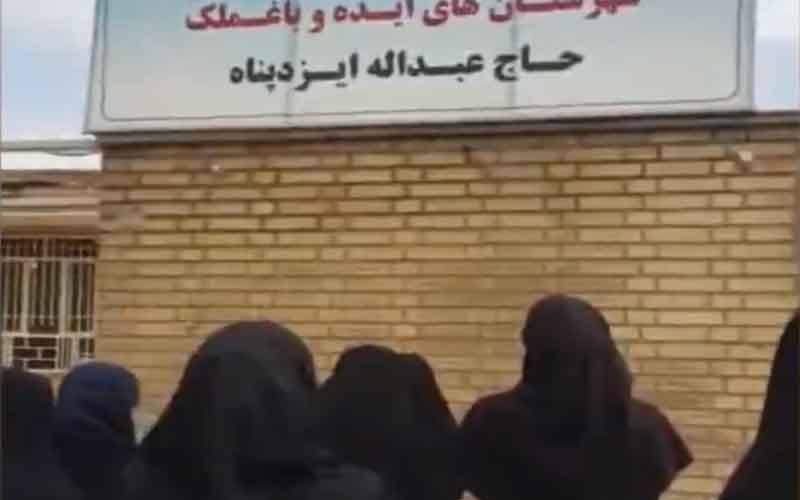
Sit-in of Preschool Educators
Khuzestan province—preschool educators in Izeh county launched an ongoing sit-in in front of MP Hedayatollah Khademi’s bureau. They protested officials’ refusal to resolve their concerns.
#IranProtests#Khuzestan—preschool educators staged an ongoing sit-in in front of the bureau of Hedayatollah Khademi, MP from Izeh & Baghmalek. They blamed officials' failure to hear and follow up the demands, announcing, "We will never give in until obtaining our demands." pic.twitter.com/ZRTbxaZokB
— Iran News Update (@IranNewsUpdate1) February 24, 2021
“We have time and again urged officials to follow up our dilemmas. Here is the bureau of MP from Izeh and Baghmalek counties. We have referred to this place several times, asking to visit the MP. However, not only did they reject to follow up our dilemmas, but they are playing to prevent us from holding a face-to-face discussion with the MP,” said a protester.
“This is our legal right that we visit the MP, and they have a duty to follow up our problems. We are legally pursuing our demands. We would never give in until obtaining our rights,” the protester added.
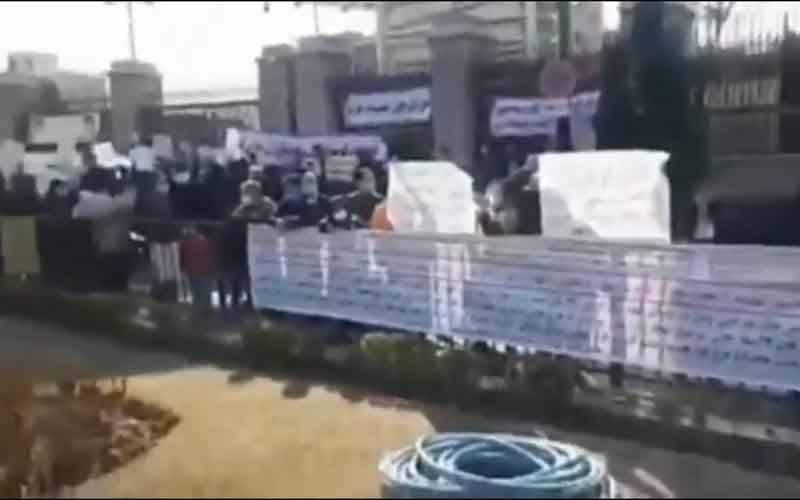
Rally of Landowners
Tehran province—more than 500 landowners of the plots of Pourqomi land in Evrin village rallied in front of the Parliament, protesting officials’ failure to follow up their demands.
#IranProtests#Tehran—more than 500 landowners of plots of Pourqomi land in Evrin village rallied in front of the Parliament, protesting officials' failure to follow up their demands. pic.twitter.com/CGZ1UF6YTa
— Iran News Update (@IranNewsUpdate1) February 23, 2021
This village is located in Baharestan county. The government’s negligence to follow up these people’s demands led them to raise their voices once again and rally in front of the Majlis.
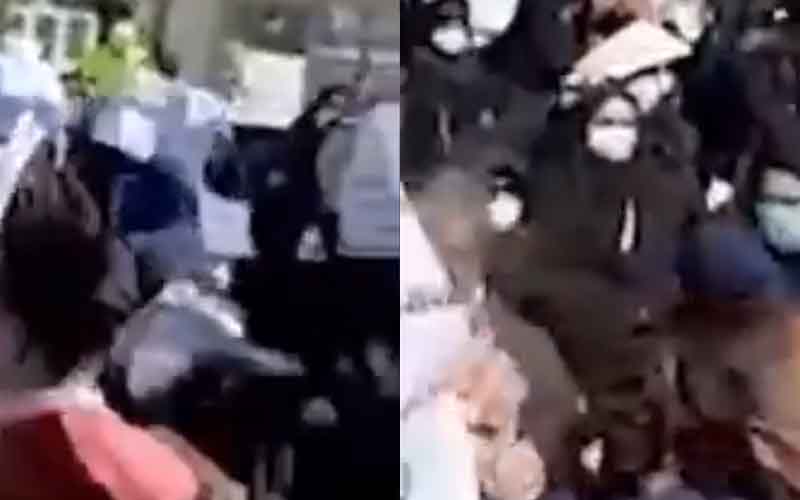
Rally of Teachers
Tehran province—teachers of non-profit schools from several provinces held a gathering in front of the Majlis. They demanded officials recruit them like contract teachers, members of the Literacy Movement, preschool educators, and other service forces.
#IranProtests#Tehran—teachers of non-profit schools rallied in front of the Parliament, demanding the government recruits them officially like other employers.
"If you fairly deal [with issues], so, why do you not care about us?" protesters chanted. pic.twitter.com/Wzh4aPHNYv— Iran News Update (@IranNewsUpdate1) February 24, 2021
“There is no support on behalf of the country’s officials” and “If you deal fairly [with different issues], so why do you not care about us?” protesters chanted.
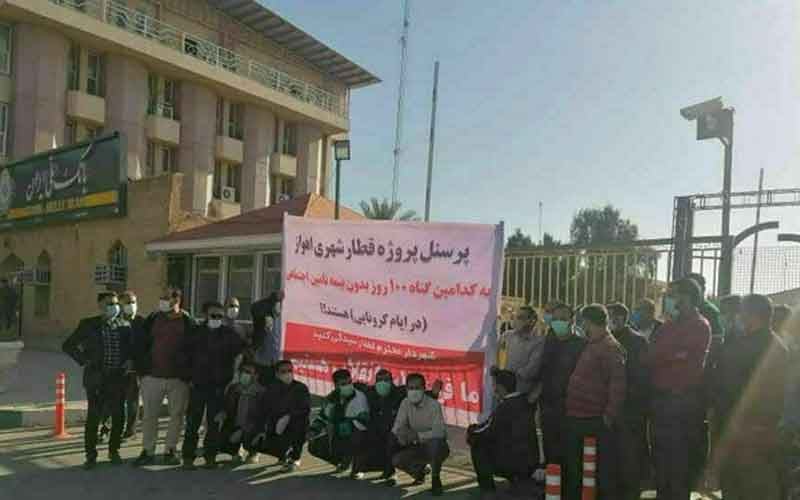
Rally of Urban Train Staff
Khuzestan province—a group of Ahvaz’s urban train crew held a rally in front of the municipality. They protested officials’ failure to pay their insurance rights in the past 100 days.
#IranProtests#Khuzestan—the crew of Ahvaz's urban train rallied in front of the municipality, blaming officials for failing to pay their insurance rights in the past 100 days. pic.twitter.com/oMLpTm7HpK
— Iran News Update (@IranNewsUpdate1) February 24, 2021
Notably, Ahvaz lacks basic infrastructure, causing enormous dilemmas for residents in different areas. Despite the province sits on the oil sea and mostly oil refineries are in this province, the people are deprived of essential services, and the government refuses to pay public crew’s salaries and rights.
Iranians Continue Protests; at Least 26 Rallies and Strikes on February 21





